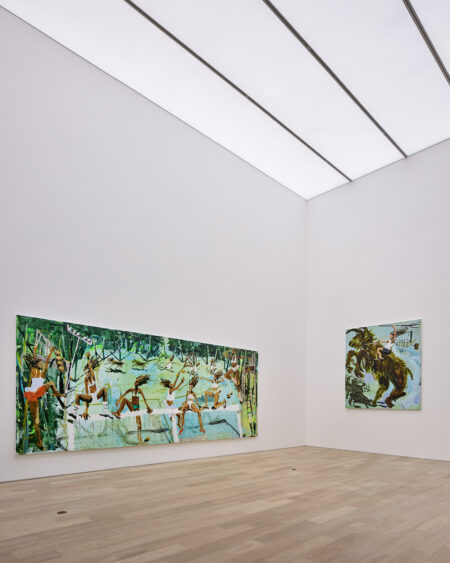LISBETH BONDE,
ART CRITIC, MA
AND CHAIRMAN OF AICA DENMARK.
AUGUST 2016
Deceitful Strategies
Mie Olise Kjærgaard
Himmerland Art Museum
September 10 to November 10 2016
A constructivist expressionist
Within the past years, Mie Olise Kjærgaard has made herself noticed on the hectic and fast-growing scene of contemporary art as an expressionistic painter with an original iconography. She operates with painting in an expanded field that the audience has been able to witness on several of her exhibitions in Denmark as well as abroad, where she has created installational constructions that engage with the painted motives on the surfaces.
She is inspired by ships and buildings, particularly abandoned, free-floating houses and huts that have lost their original function and are now left as partial ruins. When she paints she sort of acts like an architect that has permitted herself to experiment with utopian types of buildings. Either the constructions close to collapse or new improvised ones are arising.
Like only few other female artists, Mie Olise Kjærgaard does not hesitate to bring up monumental formats. Over and over again she aims really high, but whether the expresses herself in the huge scale or in the smaller one, her work is always thorough. Her unmistakable signature is a characteristic, broken palette – meaning that she mixes grey, white and black in a way that makes them appear somewhat dry and muted. She has a love for pinkish, light blue and brown nuances – and occasionally a very potent blue.
Compositionally the motives loom upwards and create new, wild structures. In these oftentimes civilization critical works chaos rules. In her three dimensional art – the installations in particular – she uses building materials directly and create pieces in the exhibition rooms, as demonstrated with her impressive show ‘The Silent Station’ in Nikolaj Kunsthal in 2012.
In may 2015 Mie Olise Kjærgaard cleared her calendar and gave herself permission to experiment with her art and plunged into deep waters in order to develop her painting. There she remained until the new year of 15/16. In her recent work she distances herself from the architectural motives and zooms in on smaller details with a pictogram-like imagery. Here she plays through a range of previous motives – pineapples, anchors, oars, palm trees, boats, coconuts and so on – to combine them for different meanings and associations to emerge. This new ‘dictionary’ is partially inspired by a visit to Venezuela prior to her solo exhibition there in 2016. Here she witnessed hammocks and laundry and notable houses built in layers. In Venezuela the ruins are brand new. For instance, banks and shopping malls that have never been completed. They’re made of glass, steel and concrete but only the skeleton of the buildings stand alongside facades of the lower floors. Because of the huge amount of homeless people in the poor country, they move into these unfinished domiciles and build upon the skeletons with bricks, wood and fabrics on the following floors. Hereby, an utterly different and bricolage-like architectural aesthetics appears. At the very top laundry is flapping in the wind. This architecture is a sign of a regime that has gone bankrupt and left its citizens hanging. The architecture of the buildings, that reflect the divided society, have wandered straight into Mie Olise Kjærgaard’s new works.
When Mie Olise Kjærgaard war studying architecture she was taught, that a construction has to be honest, meaning aesthetically consistent all the way through. In Venezuela the buildings are dishonest all the way through. Therefore, Mie Olise finds them to be very special and deeply interesting, visually and as sociological objects of study, partially because of these layered structures with horizontal dividing lines, that she’s worked into her paintings. Furthermore, compositionally her new work can be compared to exquisite corpse drawings or folded drawings, that are also built in layers. Her new pieces are more ‘dirty’ than previously. Visually they are stimulating – filled with ‘noise’ and playful, pictogram-like figurations, that are rhythmically embedded in the surface.
Mie Olise Kjærgaard has had some pretty busy years exhibition wise, as well as tremendous sales – all paintings were snatched away on the exhibition opening in her American gallery, Barbara Davis in Houston. On commending a line of new shows, Mie first thought that she could reuse her paintings, but her vanity quickly kept her from that. However, new ideas kept emerging just like the exhibition architecture is utterly different from the Politiken Vestibule, the Morsoe Art Union, Museo de Arte Acarigua in Venezuela and now the Himmerland Art Museum in Aars. Therefore she’s had to make new paintings for every exhibition. Each room has individual possibilities that can foster fabulous solutions, if you seize it the right way, she thinks. 80 percent of the works in the Himmerland Art Museum are consequently brand new.
The large room is available for Mie Olise Kjærgaard in this significant museum building, drawn by Per Kirkeby in collaboration with the architect Jens Bertelsen. She has invited the painters Ditte Ejlerskov and Johan Furåker to exhibit in the smaller room right next door. Mie Olise’s exhibition consists of a series of very large paintings and a series of very small ones, all hanging across each other on each their long wall. On the two end walls she has chosen two oblong paintings that are installed on furniture-like constructions. Hereby she sustains the installational approach that turns the paintings into object of the room.
Mie Olise Kjærgaard is raised on Mors. She was born in 1974. After having trained as an architect in 2001 on the Aarhus School of Architecture she took and MFA on Central St. Martin School of Art in London in 2007. For many years she has resided in New York, but now lives and works in Copenhagen.
—
Text: Lisbeth Bonde


